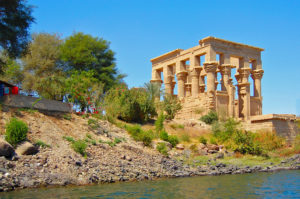
Trajan’s Bed on Agilkia Island, Egypt (Photo by Don Knebel)
When Alexander the Great conquered Egypt in 332 B.C., he was proclaimed pharaoh and considered himself a god. After Alexander’s death in Babylon in 323 B.C., his general continued the idea, becoming Pharaoh Ptolemy I. His son, Ptolemy II, built a temple to the Egyptian Goddess Isis on Philae Island in the Nile River near Aswan. The temple, mimicking much older temples, showed Ptolemy II among the Egyptian gods. Later Ptolemaic pharaohs added their own touches to the temple. When Cleopatra, the last Ptolemaic pharaoh, died in 30 B.C., Romans took control of Egypt and their emperors began acting like pharaohs. In about 100 A.D., Emperor Trajan added to the Philae Temple an aesthetically pleasing 14-column pavilion that served as a river entrance to the temple and a place for storing the boat on which Isis traveled on the Nile. The walls of what is often called “Trajan’s bed” were decorated with images of Trajan offering incense to Isis and Egyptian gods.
The first Aswan dam partially submerged the Philae temple and Trajan’s bed. With the building of the Aswan High Dam, the Philae structures were threatened with total submersion. Engineers working for nine years with UNESCO removed the temple complex from Philae, block by block, and reassembled the buildings on higher Agilkia Island, modified to resemble Philae Island. Today, the temple to Isis and Trajan’s bed are among the most intact of all ancient Egyptian temples. In 2004, the European Space Agency launched the Rosetta spacecraft toward comet 67P/Churyumov–Gerasimenko. The lander was named Philae in honor of the temple. The name of the 2014 landing spot, determined by public vote, was Agilkia, the destination of the Philae Temple and Trajan’s bed.